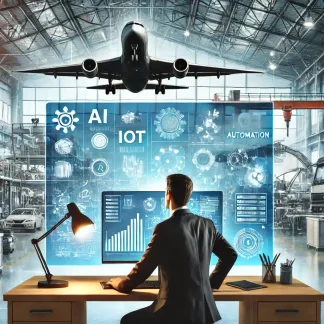Description
In the digital age, the role of the IT Director in the aerospace and automotive industries is undergoing profound transformations. These sectors, known for their demands in terms of precision and innovation, now see IT as a key strategic lever essential to their competitiveness and innovative capacity. This article explores recent changes in this role, the skills needed to excel, and how these changes influence the strategies and operations of companies in these industries.
The New Face of the IT Director Role
Traditionally, the IT Director was primarily seen as a manager of IT infrastructure. Today, their role has expanded to become that of a true strategist and innovator. In the aerospace and automotive industries, where technology is constantly evolving, this role is even more critical.
The role of the IT Director in leading sectors such as aerospace and automotive has undergone significant transformation over the years. Traditionally seen as responsible for the maintenance and management of IT infrastructure, this position has evolved well beyond mere technical supervision. Today, the IT Director is regarded as a key strategist, an innovator whose influence extends to all facets of the business. Their ability to integrate the most advanced technologies to support and drive overall business objectives has become indispensable for staying competitive in these dynamic industries.
This evolution is partly due to the accelerated pace of technological innovation and the increasing integration of complex systems, such as artificial intelligence, the Internet of Things (IoT), and cloud computing. These technologies are no longer peripheral tools but essential components that transform operations, production, and distribution. The IT Director must not only understand and master these technologies but also anticipate how they can be leveraged to improve efficiency, optimize the production chain, and provide new capabilities to the company. Their strategic vision is crucial for aligning technological innovations with the company’s long-term business strategy, making them an indispensable member of the executive team.
Furthermore, in the aerospace and automotive industry, where security and precision are paramount, the IT Director must ensure that IT systems not only support daily operations but also secure them. This involves constant monitoring of potential risks, the implementation of advanced cybersecurity solutions, and data management in a manner that complies with strict industry regulations. Thus, the role of the IT Director has metamorphosed into that of a leader capable of navigating a complex technological landscape while actively supporting the company’s growth and innovation ambitions.
Key Skills in the Digital Era
- Mastery of Cloud Computing: Cloud computing offers flexibility and elasticity, allowing companies to quickly respond to changing market needs. The IT Director must not only understand the technical aspects of the cloud but also know how to integrate it securely and effectively to support the company’s overall operations.
- Data Security: With recent regulations like the GDPR and increased risks of cyberattacks, secure data management has become a top priority. The IT Director must therefore develop robust cybersecurity strategies to protect sensitive information, particularly crucial in sectors where designs and technical data have significant commercial and strategic value.
- Expertise in Artificial Intelligence (AI): AI is transforming design, production, and after-sales service in aerospace and automotive. The IT Director must be at the forefront of AI applications, machine learning, and analytics to optimize these processes and introduce new production and predictive maintenance capabilities.
Impact on Strategies and Operations
IT Directors are now key players in the formulation and execution of business strategies. They work closely with other executives to integrate digital technologies that support the company’s overall objectives.
- Digital Transformation: In the automotive industry, for example, the digitization of assembly lines and the integration of the Internet of Things (IoT) enhance efficiency and product customization. In aerospace, digital simulation and augmented reality are used for aircraft design and maintenance, reducing costs and time to market.
- Interdepartmental Collaboration: The IT Director must facilitate effective collaboration between the IT department and other company functions, such as engineering and production, to ensure that technological innovations are well-aligned with industrial and business needs.
- Ethics and Compliance: As technology takes a central place in operations, ethical responsibility and regulatory compliance become crucial. The IT Director must ensure that the company’s practices comply with legal and ethical standards, particularly in terms of data management and privacy.
Role of the IT Director
The role of the IT Director in the aerospace and automotive industries is more dynamic and vital than ever. Not only must these professionals continually adapt their skills and knowledge to integrate the latest innovations, but they must also be visionaries who anticipate the future needs of the company, ensuring a technological integration that propels the company towards new horizons of performance and innovation.
Building Resilience Through Technological Leadership
In an era defined by rapid advancements and uncertainties, the IT Director must also focus on building resilience within their organizations. For the aerospace and automotive industries, resilience means not only recovering quickly from disruptions but also maintaining continuity in innovation and operations. The IT Director plays a pivotal role in this regard by implementing robust IT architectures and fostering a culture of adaptability.
- Scalable IT Infrastructure: Resilience starts with a scalable and flexible IT infrastructure. The IT Director must ensure that systems can handle sudden increases in demand or shifts in operational needs without compromising performance or security. Cloud-based solutions, hybrid infrastructures, and containerization are essential tools in this arsenal.
- Disaster Recovery and Business Continuity: With the critical nature of aerospace and automotive operations, downtime can lead to significant financial and reputational losses. IT Directors must develop comprehensive disaster recovery plans, leveraging redundancy and automated failover systems to minimize disruptions.
- Supply Chain Integration: IT Directors must also ensure the seamless integration of supply chain management systems with broader IT ecosystems. Predictive analytics, powered by AI and IoT, can provide visibility into potential bottlenecks and disruptions, allowing proactive responses to maintain production flow.
Future Trends Shaping the IT Director’s Role
The coming years will introduce new challenges and opportunities for IT Directors in the aerospace and automotive sectors. Staying ahead requires vigilance and a commitment to continuous learning.
- Quantum Computing: While still in its infancy, quantum computing promises to revolutionize complex problem-solving tasks, from aerodynamic simulations to supply chain optimization. IT Directors must begin exploring its potential and prepare for its eventual integration into their technological toolkits.
- Autonomous Systems: As automation becomes more pervasive, IT Directors will oversee systems that manage autonomous vehicles, robotics, and smart factories. These technologies will demand real-time data processing and a deep understanding of machine learning algorithms.
- Sustainability Through Technology: Environmental concerns are pushing companies to adopt greener practices. IT Directors will play a critical role in implementing technologies that reduce carbon footprints, such as energy-efficient data centers, digital twins, and lifecycle analysis tools.
The Evolving Leadership Paradigm
Beyond technical expertise, IT Directors must increasingly embrace leadership qualities that foster innovation and collaboration across their organizations. Soft skills are now as important as technical prowess.
- Visionary Thinking: IT Directors must anticipate trends and position their companies to capitalize on emerging technologies before competitors do.
- People-Centric Leadership: Effective IT leadership requires empowering teams, fostering cross-departmental collaboration, and cultivating a culture of innovation.
- Strategic Communication: The ability to articulate the value of IT initiatives in terms of business outcomes is essential for gaining executive buy-in and driving organizational change.
Conclusion
As the aerospace and automotive industries continue to push the boundaries of innovation, the IT Director’s role will remain central to this evolution. These professionals must act as both architects of technological infrastructure and champions of strategic vision. By mastering the latest advancements and fostering a resilient, forward-thinking approach, IT Directors will not only secure their organizations’ place in these competitive industries but also shape the future of technological progress. The key lies in balancing technical acumen with visionary leadership, ensuring that technology serves as a bridge to greater efficiency, sustainability, and innovation.




